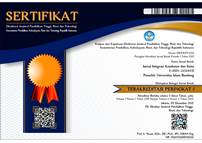Aktivitas Antibakteri Ekstrak Air Kopi Robusta (Coffea Canephora) terhadap Bakteri Pseudomonas aeruginosa
Abstract
Pseudomonas aeruginosa umum ditemukan pada Healthcare-associated infections (HAIs) dan menunjukkan resistensi pada banyak agen antimikrob yang umum. Kopi Robusta telah dipilih sebagai antibiotik alternatif karena memiliki kemampuan antibakteri. Penelitian ini bertujuan mengetahui aktivitas antibakteri ekstrak air kopi robusta (Coffea canephora) terhadap bakteri Pseudomonas aeruginosa. Penelitian dilakukan di Laboratorium Mikrobiologi dan Parasitologi Fakultas Kedokteran UNPAD periode Maret – Desember 2020. Perlakuan yang diberikan adalah media agar diberi disk yang mengandung ekstrak air kopi robusta dalam 4 dosis, yaitu 12,5%, 25%, 50%, dan 100%, imipenem (kontrol positif), dan disk yang mengandung aquadest (kontrol negatif). Agar diinkubasi dalam inkubator dengan suhu 37ºC selama 24 jam. Penilaian dilakukan dengan pengamatan dan pengukuran zona inhibisi. Data hasil penelitian membuktikan zona inhibisi yang dihasilkan oleh ekstrak air kopi robusta pada dosis 100% memiliki rerata paling tinggi dibanding dengan dosis lainnya, yaitu 8,13 mm, namun lebih kecil dibanding dengan imipenem yang memiliki rerata zona inhibisi sebesar 25 mm. Hal ini menunjukkan bahwa ekstrak air kopi robusta memiliki efek antibakteri terhadap Pseudomonas aeruginosa.
Antibacterial Activities of Robusta Coffee Water Extract (Coffea Canephora) against Pseudomonas aeruginosa Bacteria
Pseudomonas aeruginosa is common in Healthcare-associated infections (HAIs) and shows resistance to many common antimicrobial agents. Robusta coffee has been chosen as an alternative to antibiotics because of its antibacterial properties. This study aims to determine the antibacterial activity of Robusta coffee (Coffea canephora) water extract against Pseudomonas aeruginosa. The research was done in Laboratorium Mikrobiologi and Parasitologi Fakultas Kedokteran UNPAD period March – December 2020.The treatments given was agar plate that added Robusta coffee water extract (Coffea canephora) in 4 doses, namely 12.5%, 25%, 50%, and 100%, imipenem antibiotic disc (positive control), and disk containing aquadest (negative control). They were then incubated in an incubator at 37ºC for 24 hours. The assessment was carried out by observing and measuring the inhibition zone. The research data proved that the inhibition zone produced by robusta coffee water extract at a dose of 100% had the highest average compared to other doses, which is at 8.13 mm, but smaller than imipenem which had an average inhibition zone of 25 mm. This shows that robusta coffee water extract has an antibacterial effect against Pseudomonas aeruginosa.
Keywords
Full Text:
PDFReferences
Pachori P, Gothalwal R, Gandhi P. Emergence of antibiotic resistance Pseudomonas aeruginosa in intensive care unit; a critical review. Vol. 6, Genes and Diseases. Chongqing University; 2019. p. 109–19.
Ling ML, Apisarnthanarak A, Madriaga G. The burden of healthcare-associated infections in southeast Asia: A systematic literature review and meta-analysis. Vol. 60, Clinical Infectious Diseases. Oxford University Press; 2015. p. 1690–9.
Hapsari AP, Wahyuni CU, Mudjianto D. Knowledge of Surveillance Officers on Identification of Healthcare-associated Infections in Surabaya. J Berk Epidemiol. 2018 Aug 30;6(2):130.
Planet PJ. Pseudomonas aeruginosa. In: Principles and Practice of Pediatric Infectious Diseases [Internet]. Elsevier; 2018 [cited 2020 Jan 14]. p. 866-870.e1. Available from: https://linkinghub.elsevier.com/retrieve/pii/B9780323401814001559
Bassetti M, Vena A, Croxatto A, Righi E, Guery B. How to manage Pseudomonas aeruginosa infections. Vol. 7, Drugs in Context. Bioexcel Publishing LTD; 2018.
World Health Organization. Antibiotic resistance [Internet]. [cited 2020 Jan 14]. Available from: https://www.who.int/news-room/fact-sheets/detail/antibiotic-resistance
Halat DH, Sarkis DK, Moubareck CA. Carbapenem-Resistant, Gram-Negative Bacilli: The State of the Art. The State of the Art. In: Antibiotic Resistance: Mechanisms and New Antimicrobial Approaches. Elsevier Inc.; 2016. p. 93–119.
Karen C. Carroll M. Pseudomonads, Acinetobacters, and Uncommon Gram-Negative Bacteria. 26th ed. Jawetz, Melnick & Adelberg’s Medical Microbiology. McGraw Hill; 2013. 245 p.
Pang Z, Raudonis R, Glick BR, Lin TJ, Cheng Z. Antibiotic resistance in Pseudomonas aeruginosa: mechanisms and alternative therapeutic strategies. Vol. 37, Biotechnology Advances. Elsevier Inc.; 2019. p. 177–92.
International Coffee Organization. Coffee production by exporting countries [Internet]. 2019 [cited 2020 Feb 2]. Available from: http://www.ico.org/prices/po-production.pdf
Martínez-Tomé M, Jiménez-Monreal AM, García-Jiménez L, Almela L, García-Diz L, Mariscal-Arcas M, et al. Assessment of antimicrobial activity of coffee brewed in three different ways from different origins. Eur Food Res Technol. 2011;233(3):497–505.
Jeszka-Skowron M, Zgoła-Grześkowiak A, Grześkowiak T. Analytical methods applied for the characterization and the determination of bioactive compounds in coffee. Eur Food Res Technol. 2014;240(1):19–31.
Mishra MK, Slater A. Recent Advances in the Genetic Transformation of Coffee. Biotechnol Res Int. 2012;2012:1–17.
Caporaso N, Whitworth MB, Cui C, Fisk ID. Variability of single bean coffee volatile compounds of Arabica and robusta roasted coffees analysed by SPME-GC-MS. Food Res Int. 2018 Jun 1;108:628–40.
Balouiri M, Sadiki M, Ibnsouda SK. Methods for in vitro evaluating antimicrobial activity: A review. Vol. 6, Journal of Pharmaceutical Analysis. Xi’an Jiaotong University; 2016. p. 71–9.
Wijaya W, Ridwan RD, Budi HS. Antibacterial ability of arabica (Coffea arabica) and robusta (Coffea canephora) coffee extract on Lactobacillus acidophilus. Dent J (Majalah Kedokt Gigi). 2017 Feb 14;49(2):99.
DOI: https://doi.org/10.29313/jiks.v3i1.7288
Refbacks
- There are currently no refbacks.
Jurnal Integrasi Kesehatan dan Sains is licensed under a Creative Commons Attribution-NonCommercial-ShareAlike 4.0 International License.







.png)
_(1).png)




















